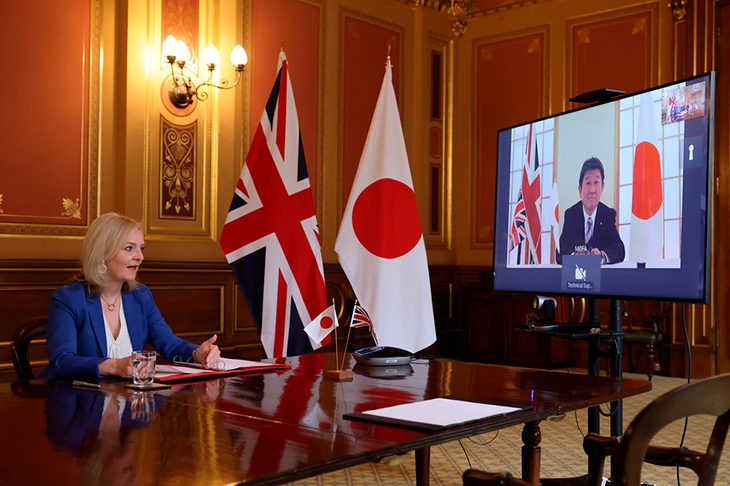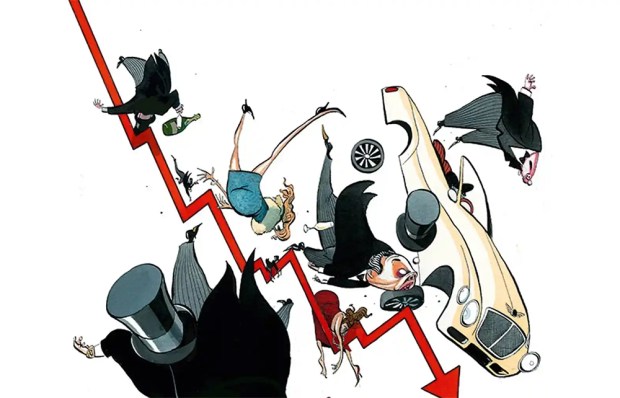A small cheer for Liz Truss’s treaty with Japan. It is, says the official press release, ‘the UK’s first major trade deal as an independent trading nation’ — and we must hope, the harbinger of much bigger deals to come. Even on the government’s own analysis, this one claims to deliver just £1.5 billion to the UK economy and an increase in UK workers’ wages of ‘£800 million in the long run’, whatever that means. What it highlights, I’m afraid, is the imbalance between the range of goods and services that the post-industrial UK is actually able to offer foreign partners — and how much more we need from them, chiefly in the form of inward investment.
On one side, we’re desperate for the Japanese to continue investing in our car and rail industries, most especially in the Nissan plant at Sunderland and the Hitachi train factory at Newton Aycliffe; and we sincerely wish Hitachi and Toshiba would reverse their decisions to pull out of building nuclear power stations here. On the other side, we’ll be able to sell them more knitwear, biscuits, English sparkling wine, Welsh lamb — and malt to make their own whisky so they don’t need to buy ours.
Then there’s financial services, at which we’re still pretty good: but has any foreign entrant ever successfully penetrated Japan’s domestic market? And finally, of course, there’s blue cheese. I scoffed when this quintessentially British product was spun as the ace in Liz Truss’s negotiating hand last month, but sure enough it won a place in the final announcement. And I’m pleased to see someone at the table was batting for Yorkshire’s finest creamery: Wensleydale’s name appears five paragraphs above Stilton’s.
The devil we know
I offered a disapproving sketch last week of Softbank, the Japanese tech investor and market speculator that owns the UK’s leading digital venture, Cambridge-based chip designer Arm Holdings. So you might expect positive reactions from me and others to this week’s news that Softbank is relieving its financial strain by selling Arm to a US player in the chip industry, Nvidia. But in fact the deal has provoked protests, led by Arm founder Hermann Hauser, and calls for the government to stop it. Softbank — the devil we know, as it were — held to a promise to keep Arm jobs and research in Cambridge. Nvidia might not do so — and as part of a company subject to US export controls on tech products, Arm will become a pawn in Trump’s trade war with China. So that’s another reason to plead with our Japanese friends: by all means enjoy the cheese and biscuits, but please don’t withdraw from serious industrial investment here.
Reduced to rubble
When Jean-Sébastien Jacques was promoted to chief executive of the mining giant Rio Tinto in 2016, he told the media his aim was to be ‘boring for a long time’ — by which he meant a focus on cost-cutting, productivity and the avoidance of scandal. His predecessors had been tainted by ‘Guineagate’, the saga of Rio’s involvement in the Simandou iron ore prospect in the Africa state of Guinea, in which the company admitted making questionable payments to a French banker who had intervened on Rio’s behalf with Guinea’s president. Jacques pulled Rio out of that project, squared other legacy issues and did his best to keep his head down, but has now been forced to quit because of a new reputational fiasco that has enraged investors as well as Rio’s eco-critics: the destruction of sacred Aboriginal cave shelters in Australia in order to gain access to another iron ore deposit.
Some pundits see this as a signal of how difficult it has become, against a tide of protest, for natural resources companies to exploit new finds anywhere on the planet. Other have noted the folly of trying to assuage hostile opinion, as Rio did, by cutting senior bonuses — thereby drawing attention to the excesses of executive pay. But to me there’s a different rule of corporate life highlighted by Jacques’s admission to an Australian parliamentary inquiry that he did not realise the cultural significance of the caves until after his crew had reduced them to rubble: that in any big international business, someone is bound to be doing something disastrous that head office doesn’t know about yet. It could involve a fraud, a data breach, a crazy acquisition, a product that poisons consumers — or a bundle of dynamite wired to a sacred heritage site. The chief executive’s job is to apply controls strong enough to avert these things before they happen. In the real world, that’s often impossible.
Tae the lassie
Last week I also ventured a gender stereo-type, about senior female bankers being ‘safer hands than their macho peers’. And I can only assume my column was tabled at Citigroup in New York before the bank’s board decided to appoint Jane Fraser — a 53-year-old mother of two and accountant’s daughter from St Andrew’s in Fife — as its new chief executive. With 200 million customer accounts, 200,000 staff and a vast portfolio of risk-laden businesses under her command, this former Goldman Sachs analyst and McKinsey partner has scaled the pinnacle of global banking and I raise my whisky glass to her.
Further research of the kind you won’t find in the Wall Street Journal tells me she’s also the granddaughter of a Royal Artillery major and great-granddaughter of an admiral, both being chieftains of the clan Dundas. Besides that warrior heritage she’ll need luck, particularly in relation to my ‘something going wrong somewhere’ rule above. I could chance another stereotype and say that it’s always wise to pick a tough Scot to run a big bank, but that one was comprehensively disproved by Fred Goodwin and his cohort in 2008. Jane Fraser has the opportunity to revive her nation’s financial reputation as she boosts returns for Citi’s long-suffering shareholders.
Got something to add? Join the discussion and comment below.
Get 10 issues for just $10
Subscribe to The Spectator Australia today for the next 10 magazine issues, plus full online access, for just $10.
You might disagree with half of it, but you’ll enjoy reading all of it. Try your first month for free, then just $2 a week for the remainder of your first year.















Comments
Don't miss out
Join the conversation with other Spectator Australia readers. Subscribe to leave a comment.
SUBSCRIBEAlready a subscriber? Log in